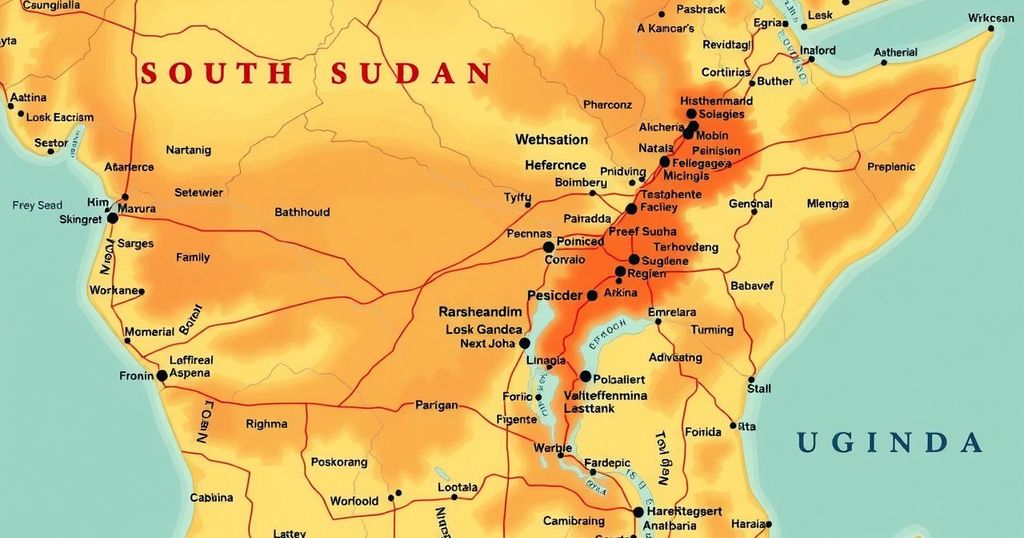The article discusses South Sudan’s complex relationship with Uganda, highlighting historical ties, military support during independence, and ongoing challenges exacerbated by Uganda’s military involvement. Post-independence dynamics reflect both cooperation and competition, impacting stability and economic development. The need for a balanced foreign policy that protects South Sudan’s sovereignty while addressing governance issues is emphasized.
South Sudan, the world’s newest nation, faces a critical juncture in its relations with Uganda. These two countries share historical ties along with contrasting political objectives, factors that could significantly impact their respective stability and economic progress. The support Uganda offered during South Sudan’s lengthy fight for independence, which culminated on July 9, 2011, included military and logistical aid from Ugandan troops under President Yoweri Museveni, who partnered with the Sudan People’s Liberation Army (SPLA) against the Sudanese government, often masked as a campaign against the Lord’s Resistance Army (LRA).
Post-independence, the relationship between South Sudan and Uganda has been marked by both collaboration and rivalry. South Sudan has emerged as a key market for Ugandan industrial products, while Uganda has played a pivotal role in facilitating peace efforts through the Intergovernmental Authority on Development (IGAD). Additionally, Uganda’s provision of trade links has enabled the flow of goods into the landlocked South Sudan, enhancing its economic prospects.
Nevertheless, the relationship has been fraught with difficulties. Uganda’s military presence in South Sudan has become a contentious issue, particularly following the onset of civil war in December 2013. The deployment of the Ugandan People’s Defense Force (UPDF) to back President Salva Kiir against Riek Machar’s opposition exacerbated political tensions and led to substantial human loss and infrastructure damage. The upheaval resulted in thousands being displaced and created substantial humanitarian needs in war-affected regions, contributing to a surge in refugee populations.
Although a peace agreement in 2018 ostensibly ended the internal conflict, South Sudan continues to grapple with fragile governance and a humanitarian crisis. Relations with Uganda are influenced by broader geopolitical considerations, as their involvement in regional conflicts, such as those in the Democratic Republic of Congo and Somalia, raises concerns regarding adherence to international humanitarian norms.
Uganda’s support for Kiir’s administration has influenced South Sudan’s political landscape, causing opposition factions to accuse Uganda of bias, which, in turn, has intensified domestic divisions. The competition for influence extends to economic interactions, with both nations looking to capitalize on their shared border, crucial for trade and energy supplies. Uganda has enhanced its infrastructure, including oil pipelines, that could connect South Sudan’s oil resources to its markets, although this has the potential to exacerbate tension as both nations vie for control over resources.
International interest in South Sudan’s oil sector has grown, with Uganda seeking to secure strategic investments despite the current instability. The strategic importance of South Sudan in the Horn of Africa makes it a focal point for global actors, with its relationships with Sudan, Ethiopia, and Kenya shaping its foreign policy amid competing powers like the U.S., China, and Russia interested in the region’s resources.
As one of East Africa’s more stable nations, Uganda seeks to maintain South Sudan’s stability to protect its borders and regional influence. Yet, criticisms have emerged, particularly from Sudan, which has supported rebel factions in South Sudan, complicating bilateral relations. International organizations such as the United Nations and the African Union have also impacted Uganda’s strategies, prompting calls for a more impartial stance that promotes comprehensive dialogue among South Sudanese factions.
Establishing a clear diplomatic strategy is essential for South Sudan, balancing its economic and military dependency on Uganda with the imperative of preserving its sovereignty. Diversifying international partnerships and reinforcing bonds with regional allies like Ethiopia and Kenya could pave the way for a more balanced foreign policy. Most importantly, tackling governance issues within South Sudan is crucial to mitigate foreign interference in its domestic matters.
To counter external influence stemming from a weak governance framework, South Sudan must foster inclusive governance and focused peacebuilding efforts to disengage from the cross-currents of regional politics.
In conclusion, South Sudan must tactfully navigate its relationship with Uganda while prioritizing its sovereignty and internal stability. Strengthening ties with regional partners and addressing governance challenges are crucial for minimizing foreign interference and fostering lasting peace. A balanced approach to foreign policy is essential to safeguard the nation’s interests in a complex geopolitical landscape.
Original Source: www.radiotamazuj.org






